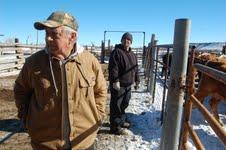
Over the last 12 years, the USDA has settled landmark loan discrimination cases brought by black and Native American farmers. Now they’re offering $1.3 billion to Hispanic and women farmers to resolve discrimination that took place between 1981 and 2000. Yet many ranchers in the Southwest say it’s an unfair process that doesn’t go far enough to address past discrimination.
It’s a bitterly cold January morning in Antonito, Colorado, and the snowy peaks of the Sangre de Cristo and San Juan mountains ripple white on the horizon. Three generations of the Abeyta family drive cows and calves through the snow to a corral with shelters.
Alfonso Abeyta is the seventy-five year-old patriarch of this sheep and cattle ranch, just north of the New Mexico border. The Conejos River meanders through the ranch, providing water for livestock and irrigation. "I fished this river since I was a little boy," Abeyta says, "and we always preserved wild game, we have deer, elk, in our place."
Abeyta grew up bottle-feeding lambs and running sheep, as he says, “from the Rio Grande to the Continental Divide.” His roots here go back centuries, to the first Spanish settlers and Native American groups. Like most men in Antonito, Abeyta joined the Marines after high school. But he says his heart was always in ranching. So when he returned home in the early 1960s, he applied for a loan to buy his own land.
Abeyta recalls going to the local farm service office, where the loan officer turned him down, "And just as I was leaving he says, well son, you know, God made you Spanish people to be farm workers, not farm owners. And ah, I walked out of there almost with tears in my eyes, as a young man I felt insulted, and that was my first experience with USDA, the Department of Agriculture."
Abeyta says this incident was the first in four decades of discriminatory treatment by the USDA. He maintained his ranch by working full-time, and he filed multiple appeals with the agency.
So he joined 1400 other Hispanic ranchers and farmers from around the nation in the 2000 Garcia lawsuit. They alleged they were denied loans because of their ethnicity.
The courts found a clear pattern of discrimination by the agency against African American and Native American farmers, and the government negotiated large settlements. But the judge in the Garcia case refused to grant Hispanics the right to sue as a group.
"There is no question that the discrimination took place, because it’s very well documented," says Rudy Arredondo, president of the National Latino Farmers and Ranchers Trade Association. "However the judiciary saw fit not to give them class status…
Arredondo explains that once the courts ruled against Hispanic farmers, their options were limited. Some farmers chose to continue suits on their own. Then in early 2012, the federal government announced a plan to offer compensation for Hispanic and women farmers. Lawrence Rael is the state executive director for the Farm Service Agency in New Mexico. " I think that this is an acknowledgement from the secretary and the president saying, look, we’ve got history of what happened before with minority groups, because of these lawsuits."

Rael explains that farmers can file for damages as a result of discrimination they experienced between 1981 and 2000.
Rael says about 200 New Mexican farmers have filed claims to date, midway through the six month application window. But advocates like Arredondo say Hispanic ranchers and farmers haven’t applied in greater numbers because the application is unfairly complicated.
Hispanic farmers must provide statements of witnesses to discrimination and other documentation not required of Native and black farmers. Many farmers protest that they don’t have copies of loan applications or appeals filed decades ago, and that documents were destroyed by the USDA. "The process with the Garcia and the women’s is so outrageous," says Arredondo, "the likelihood of them being successful in them getting their claims is gonna be extremely difficult."
In response, Farm Service Agency director Rael says the standards were put in place to prevent false claims, and the program is the best the government can do. "This process is not absolutely perfect, but it is, give people an alternative."
For his part, Abeyta has kept meticulous records. He has three binders four inches thick with papers. Abeyta estimates that he lost more than $3 million in the two decades covered by the program, due to delays and denials. But he’s only able to apply for $250,000.
Other ranchers have given up on the process. Francisco Vigil is a rancher from Taos County and one of the original plaintiffs in the Garcia case. He’s decided not to apply for compensation. " I was not so much interested in the compensation," Virgil says, "I was interested in righting what was wrong, it’s a bad feeling to be discriminated against, you know."
Alfonso Abeyta says his decision to file a claim is about more than money lost. "Because money isn’t everything. "It’s just that, I don’t want my grandson to have to go through what I went through. That’s the reason."

And Abeyta says he’s noticed changes in recent years in the local farm services office—where once he was called, “son,” now they call him “Mr. Abeyta.”

